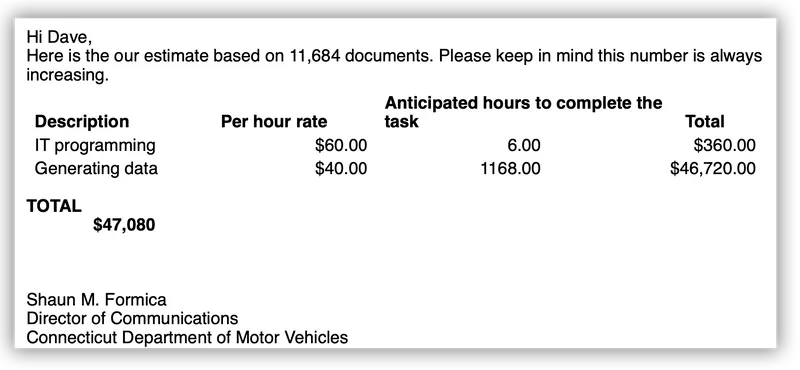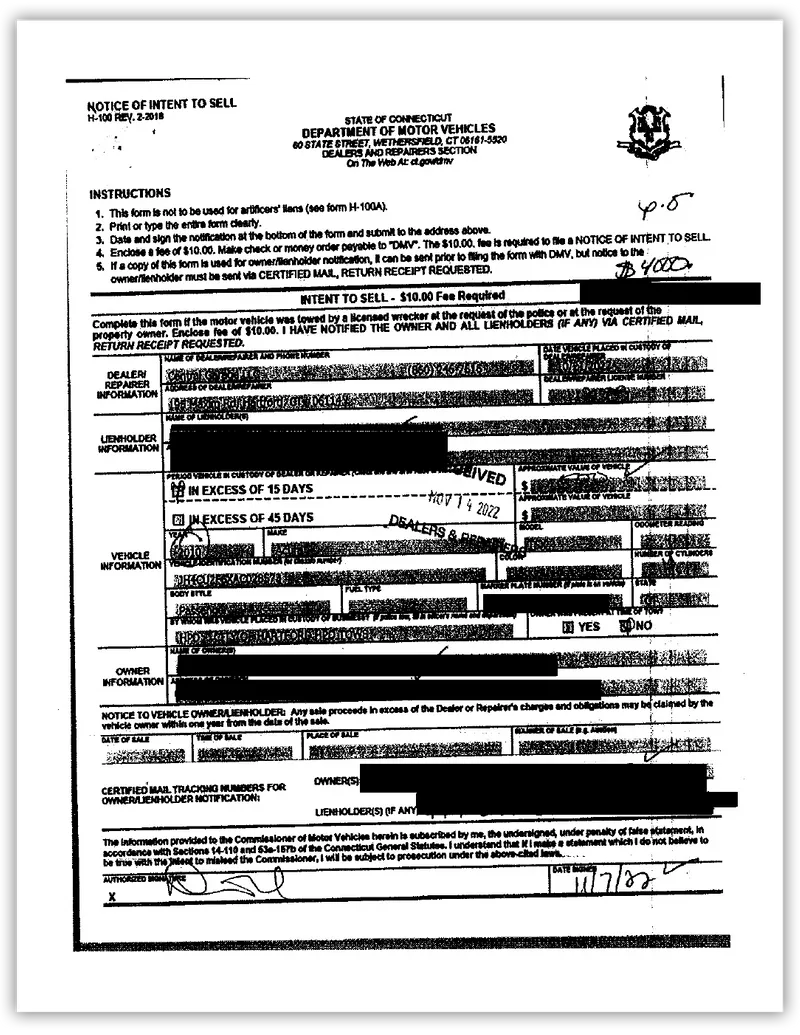This article was prepared for ProPublica’s Local Reporting Network in partnership with Connecticut Mirror and originally published in our Dispatches newsletter; sign up receive notes from our journalists.
In the summer of 2022, a source called me and told me about the towing. “The details of how it works,” he said, “are mind-boggling.”
It turns out that Connecticut has a more than 100-year-old law that allows it tow truck companies to sell someone’s car 15 days after they drive it, if they can convince the Department of Motor Vehicles that the vehicle is worth $1,500 or less.
The deadline, we found out after calling every state, is one of the shortest in the country.
So I decided to answer what I thought was a simple question: How many cars did tow trucks sell?
I submitted a request to the DMV under the Connecticut Freedom of Information Act.
Two and a half years later, it seems like the DMV doesn’t even know the answer, and we’re still waiting on thousands of records.
In the fall of 2022 the DMV told me it would cost us $47,000 to get the paperwork. Not only did it sound like the sticker price of a new car, I realized we were in for a long fight. (The DMV now says the assessment was a mistake.)

credit:
Obtained by CT Mirror and ProPublica
We looked for the one-page forms called the H-100 that tow companies must submit to the DMV in order to get permission to sell someone’s vehicle. These forms can help us learn a lot of information—what companies are trying to sell cars quickly and what the DMV is doing with those requests.
Obtaining the documents was key to learning about towing practices in Connecticut and the real impact they have on people’s lives.
After we asked the DMV to prepare a detailed accounting of the $47,000 bill, we asked our attorney to Commission on Freedom of Information. Our attorney reached a compromise in April 2023. We agreed to pay $1,900 to cover the agency’s costs of redacting thousands of documents related to our request.
The following month we received our first batch of molds and it finally seemed like we were on our way until I opened the first batch and saw this:

credit:
Obtained by CT Mirror and ProPublica
In addition to being heavily redacted, many of the forms were handwritten, and the DMV appears to have no database or system to keep track of them. Agency officials initially told us there were 11,700 documents. Then we were told there were more than 7,000 in 2022 alone. Now they say there are about 4,100 for that year. The DMV couldn’t explain the discrepancies. Officials also said the request took a long time because they had to manually redact thousands of documents.
The slow delivery of DMV forms has forced us to look for other ways to find people whose cars have been towed and then sold without their consent.
My colleague Ginny Monk, who works in housing, has heard complaints from tenants about the tow companies contracted by their apartment complexes. People have been towed for not pulling into their parking spaces or not displaying their parking stickers properly. Many couldn’t get to the tug, which was at least half an hour away, and others simply didn’t have the money to pay the toll.
By law, towing companies must notify local police within two hours of towing a vehicle. So we sent public records requests to several police departments for their call logs.
We also requested incident reports from the police department where one tow truck was located and found dozens of complaints, mostly from people who said they either couldn’t get their cars back or were being overcharged.
Good journalism matters:
Our nonprofit, independent newsroom has one mission: to hold powerful people accountable. This is how our investigations are progressing driving real-world change:
We are trying something new. Was it helpful?
Police records also mention DMV investigations into some of the same incidents. So in February, we filed a Freedom of Information request with the DMV to investigate several tow companies. It took four months, but it gave us a deeper understanding of the problem.
“To some it may just be a car,” Melissa Anderson of Hamden, Conn., wrote in her complaint, “but to my family it was sanity and peace of mind stolen from us.”
As we got closer to publishing our story last fall, the DMV started sending us more forms. We now have about 4200. But the agency’s lawyer told us there are thousands more that he still needs to hand over.
At least a few days after our story was published two bills were introduced in the state legislature to address some of the issues raised in our report. The DMV said it would conduct a “comprehensive review” of towing practices, and the House speaker promised that fixing towing laws would be a “priority” this legislative session.
We hope that the interest generated by our story will prompt the DMV to release the rest of the records soon. Meanwhile, if your car was towed in Connecticut, we hope you’ll take some time to fill out this questionnaire.
Ginny Monk, The Connecticut Mirror, reported.

